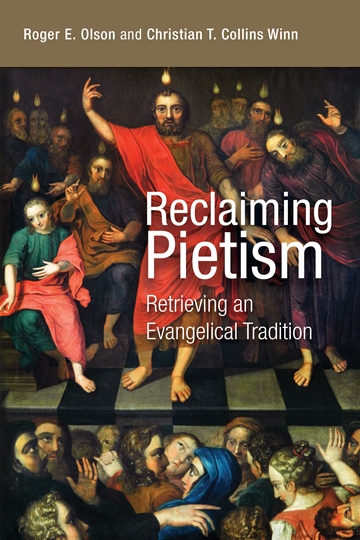Roger Olson and Christian Winn: Reclaiming Pietism
 Roger E. Olson and Christian T. Collins Winn, Reclaiming Pietism: Retrieving an Evangelical Tradition (Eerdmans, 2015), 204 pages, ISBN 9780802869098.
Roger E. Olson and Christian T. Collins Winn, Reclaiming Pietism: Retrieving an Evangelical Tradition (Eerdmans, 2015), 204 pages, ISBN 9780802869098.
If my mainline seminary education was typical, very little is taught about Pietism. When I found a dingy copy of Pia Desideria at a used book sale while on vacation a few years after graduation, I recognized the title and its author, Philipp Jakob Spener, but could not remember much else. Reading it, I had the reaction that quite a few people still have. The book was obviously written centuries ago, and while it doesn’t have that “contemporary air” that reviewers are always finding in old books, some of what Spener addressed had direct application to our present situation.
And so began my interest in “the flowering of the German Lutheran Churchly Pietists” a period from 1675-1725, roughly spanning the careers of Spener and August Hermann Francke. I still await the awakening of fellow clergy and our professors to its benefits. There have been a few stirrings. Bethel had a conference on “The Pietist Impulse” in 2009, and a collection of articles was released in 2011 as The Pietist Impulse in Christianity. The label Pietism is tossed around a bit in social media, and I was even interviewed recently for a podcast, but for the most part, pietism is spoken of as a form of legalism, basically. We also hear that pietists are anti-intellectual, are all about having a religious experience, they don’t care about the Sacraments, and all sorts of things that I do not see in my historical research. Of course, the problem here is we are talking about is a movement spanning four hundred years, and radicals who really were “enthusiasts” are included under that label, but we should follow the advice that a movement is known by its broad middle and not its fringes.
Roger Olson and Christian Winn have attempted to explain how a “good word got a bad reputation” in the readable, historical and theological work Reclaiming Pietism. It will have to be seen if this 2015 offering from Wm. B. Eerdmans is up to the task of its title. After all, as they say, not even religious scholars in the United States today know what Pietism is. That is a little odd since the two most influential forms of Christianity here were Puritanism and Pietism. No American history course is complete without a segment on the Puritans, yet as Olson and Winn point out there is a good case to be made that Pietism was just as influential if not more so.
It is as if Pietism fell off the radar. When mentioned at all, it is a pejorative term. It may be surprising for Americans to learn that Pietism studies are taken seriously in Germany. They see, as we should, that it was important to their development. It is perhaps worth noting that the Wikipedia page for the former dean of Pietism research in America is in German.
In Germany in the 1980s and 1990s Martin Brecht and Johannes Wallmann had a long debate whether the movement should be dated from the time of Johan Arndt and include Reformed thinkers from Britain and the Netherlands, or if it was begun by Philipp Jakob Spener and properly understood as having Lutheran roots. Germans followed the papers from Brecht and Wallman with great interest and academics took sides. Only a handful of people here know anything about this.
If for no other reason than giving educators a resource to fill that blank, Reclaiming Pietism meets a need. However, since it is a clearly written, historical survey taking advantage of the work of Stoeffler from about fifty years ago and the more recent work of Douglas Shantz, Jonathan Strom and others, it may well excite even more research. Olson and Winn are leading scholars themselves in the new Pietism research, Winn having been a student of Donald Dayton at Drew concentrating in the work of the Blumhardts before teaching at Bethel University in St. Paul, and Olson having a long career as an educator and author, now teaching at Baylor.
Category: Church History, Fall 2015


